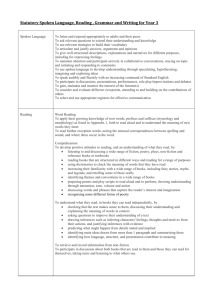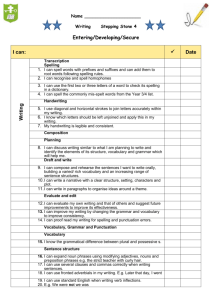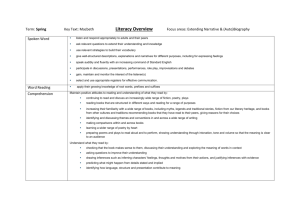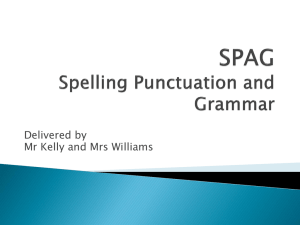Literacy Medium Term Planning
advertisement
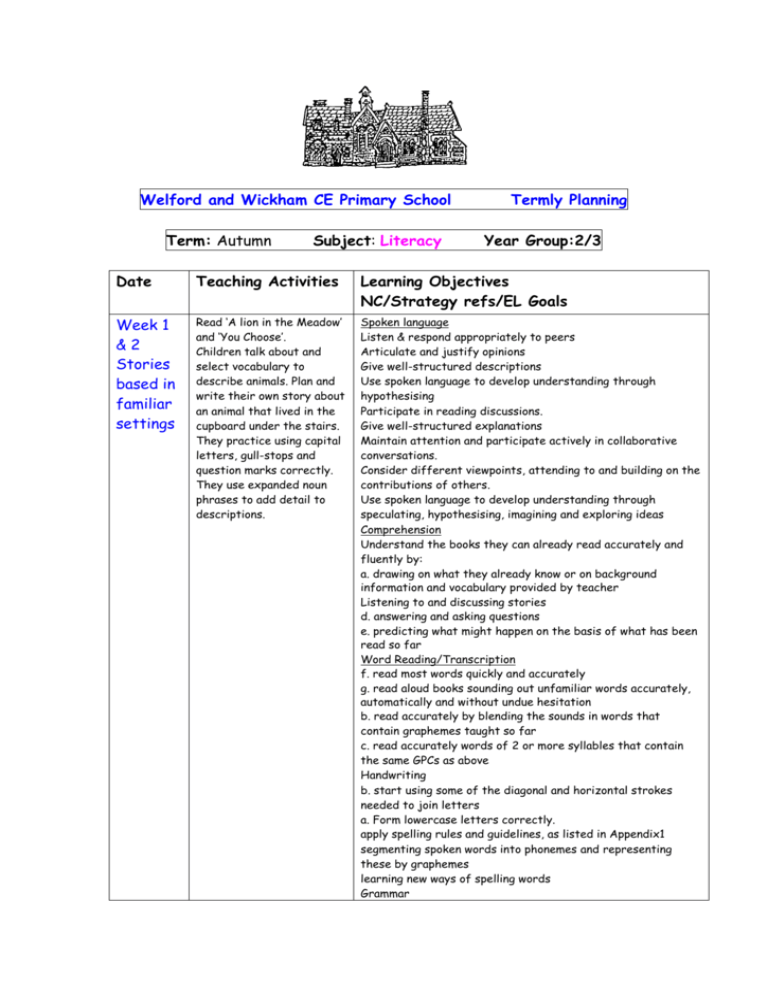
Welford and Wickham CE Primary School Term: Autumn Subject: Literacy Termly Planning Year Group:2/3 Date Teaching Activities Learning Objectives NC/Strategy refs/EL Goals Week 1 &2 Stories based in familiar settings Read ‘A lion in the Meadow’ and ‘You Choose’. Children talk about and select vocabulary to describe animals. Plan and write their own story about an animal that lived in the cupboard under the stairs. They practice using capital letters, gull-stops and question marks correctly. They use expanded noun phrases to add detail to descriptions. Spoken language Listen & respond appropriately to peers Articulate and justify opinions Give well-structured descriptions Use spoken language to develop understanding through hypothesising Participate in reading discussions. Give well-structured explanations Maintain attention and participate actively in collaborative conversations. Consider different viewpoints, attending to and building on the contributions of others. Use spoken language to develop understanding through speculating, hypothesising, imagining and exploring ideas Comprehension Understand the books they can already read accurately and fluently by: a. drawing on what they already know or on background information and vocabulary provided by teacher Listening to and discussing stories d. answering and asking questions e. predicting what might happen on the basis of what has been read so far Word Reading/Transcription f. read most words quickly and accurately g. read aloud books sounding out unfamiliar words accurately, automatically and without undue hesitation b. read accurately by blending the sounds in words that contain graphemes taught so far c. read accurately words of 2 or more syllables that contain the same GPCs as above Handwriting b. start using some of the diagonal and horizontal strokes needed to join letters a. Form lowercase letters correctly. apply spelling rules and guidelines, as listed in Appendix1 segmenting spoken words into phonemes and representing these by graphemes learning new ways of spelling words Grammar Week s 3&4 Instruct ions Using art activities and the book The Usborne Complete Book of Art ideas as a vehicle for instruction writing children will practise using imperative verbs and pronouns. a. learning how to use both familiar and new punctuation correctly, including full stops, capital letters, exclamation marks & question marks b. learning how to use: expanded noun phrases to describe and specify, e.g. the blue butterfly Use grammar terminology Composition Consider what they are going to write before beginning by: a. planning or saying out loud what they are going to write about b. writing down ideas and/or key words including new vocabulary c. encapsulating what they want to say, sentence by sentence Develop positive attitudes towards and stamina for writing by: a. writing narratives, about personal experiences and those of others (real and fictional) Spoken language a. listen and respond appropriately to adults and their peers b. Ask relevant questions to extend understanding and knowledge c. use relevant strategies to build their vocabulary e. give well-structured descriptions and explanations for diff. purposes, f. participate actively in collaborative conversations h. speak audibly and fluently g. use spoken language to develop understanding through speculating, hypothesising, imagining and exploring ideas Comprehension Develop positive attitudes by: a. listening to and discussing a wide range of fiction, poetry, plays, non-fiction & reference books or textbooks Understand what they read by: f. identifying how language, structure, and presentation contribute to meaning Develop positive attitudes by: c. using dictionaries to check the meaning of words that they have read Understand what they read by: a. checking that the text makes sense to them, explaining the meaning of words in context e. identifying main ideas drawn from more than one paragraph and summarising these Word Reading/Transcription Spelling c. spell words that are often misspelt Handwriting a. use the diagonal and horizontal strokes that are needed to join letters b. increase the legibility, consistency and quality of their Grammar Develop their understanding by: b. using the present perfect form of verbs in contrast to the past tense (recognising verbs as a command) c. choosing nouns or pronouns appropriately for clarity and cohesion and to avoid repetition Composition Plan their writing by: a. discussing writing similar to that which they are planning to write in order to understand and learn from its features b. discussing and recording ideas Draft and write by: a. composing and rehearsing sentences orally b. organising paragraphs around a theme d. in non-narrative material, using simple organisational devices [for example, headings and sub-headings] Proof-read for spelling and punctuation errors Evaluate and edit by: a. assessing the effectiveness of their own and others’ writing and suggesting improvement Weeks 5&6 Poetry Children explore how simile and metaphor can be used to create powerful images, though reading and discussing poems. Photographs, collage and Jeannie Baker's Window inspire children's own image poetry. Spoken language Pupils should be taught to: a. listen and respond appropriately d. articulate and justify answers, arguments and opinions f. maintain attention and participate actively in collaborative conversations, staying on topic and initiating and responding to comments g. use spoken language to develop understanding through speculating, hypothesising, imagining and exploring ideas i. participate in discussions/ presentations /performances /debates j. gain, maintain and monitor the interest of the listener(s) k. consider and evaluate different viewpoints, attending/building on the contributions of others Comprehension Develop positive attitudes to reading by: a. listening to/discussing a wide range of fiction, poetry, plays, non-fiction and reference books or textbooks c. using dictionaries to check the meaning of words that they have read f. preparing poems and play scripts to read aloud and perform, showing understanding through tone, intonation, volume & action g. discussing phrases to capture reader’s imagination Understand what they read by: f. identifying how language, structure, & presentation contribute to meaning Word Reading/transcription Handwriting b. increase the legibility, consistency and quality of their handwriting Spelling e. use the first two or three letters of a word to check its spelling in a dictionary Grammar Develop their understanding by: a. using commas after fronted adverbials c. choosing nouns appropriately d. using adverbs e. using fronted adverbials f. learning grammar in Appendix 2 Composition Plan their writing by: a. discussing writing similar to that which they are planning to write in order to understand and learn from its structure, vocabulary and grammar b. discussing and recording ideas Draft and write by: a. composing and rehearsing sentences orally, progressively building a varied and rich vocabulary and an increasing range of sentence Evaluate and edit by: a. assessing the effectiveness of their own and others’ writing and suggesting improvements Week 7 &8 Stories set in familiar settings Children Explore familiar settings by meeting Horrid Henry and his friends (and enemies). In particular read Horrid Henry and Horrid Henry’s Birthday Party both by Francesca Simon. Learn about and use adverbs, adverbials and prepositions. Write a new Horrid Henry story. Use and recognise nouns, adjectives and prepositional phrases Use adverbs Use adverbs and prepositions to express time and place Spoken language Pupils should be taught to: a. listen and respond appropriately to adults and their peers b. ask relevant questions to extend their understanding and knowledge c. use relevant strategies to build their vocabulary d. articulate and justify answers, arguments and opinions f. maintain attention and participate actively in collaborative conversations g. use spoken language to develop understanding Comprehension Develop positive attitudes by: a. listening to and discussing a wide range of fiction b. reading books that are structured in different ways and reading for a range of purposes g. discussing words and phrases that capture the reader’s interest and imagination Understand what they read by: f. identifying how language, structure, and presentation contribute to meaning Word Transcription Spelling a.apply their growing knowledge of root words, prefixes and suffixes Handwriting a. use the diagonal and horizontal strokes that are needed to join letters b. increase the legibility, consistency and quality of their write from memory simple sentences using punctuation taught Grammar a. using commas after fronted adverbials d. using conjunctions, adverbs and prepositions to express time and cause Use and recognise nouns, adjectives and noun phrases. e. using fronted adverbials f. learning the grammar for years 3 and 4 in English Appendix 2 Composition Plan their writing by: a. discussing writing similar to that which they are planning to Week 9 & 10 NonFiction Explanat ions Children will look at the difference between instructions and explanations. They will explore the structure of explanations in detail. Practise taking and using notes. Use notes to write parts of explanation texts. write in order to understand and learn from its structure, vocabulary, grammar discussing and recording ideas Draft and write by: a. composing and rehearsing sentences orally (including dialogue), building a varied vocab and an range of sentence structures (English Appendix 2) c. creating settings, characters and plot Spoken language a. listen and respond appropriately to adults and their peers b. Ask relevant questions to extend understanding and knowledge c. use relevant strategies to build their vocabulary e. give well-structured descriptions and explanations for diff. purposes, f. participate actively in collaborative conversations h. speak audibly and fluently g. use spoken language to develop understanding through speculating, hypothesising, imagining and exploring ideas Comprehension Develop positive attitudes by: a. listening to and discussing a wide range of fiction, poetry, plays, non-fiction & reference books or textbooks Understand what they read by: f. identifying how language, structure, and presentation contribute to meaning Develop positive attitudes by: c. using dictionaries to check the meaning of words that they have read Understand what they read by: a. checking that the text makes sense to them, explaining the meaning of words in context e. identifying main ideas drawn from more than one paragraph and summarising these Word Reading/Transcription Spelling c. spell words that are often misspelt Handwriting a. use the diagonal and horizontal strokes that are needed to join letters b. increase the legibility, consistency and quality of their Grammar Develop their understanding by: b. using the present perfect form of verbs in contrast to the past tense (recognising verbs as a command) c. choosing nouns or pronouns appropriately for clarity and cohesion and to avoid repetition Composition Plan their writing by: a. discussing writing similar to that which they are planning to write in order to understand and learn from its features b. discussing and recording ideas Draft and write by: Weeks 11 & 12 Poetry Children will enjoy humorous poems about teachers which will inspire learning about powerful verbs, verb tenses, adverbs and adverbial phrases. Children use the poems they read as models for writing their own verses and poems a. composing and rehearsing sentences orally b. organising paragraphs around a theme d. in non-narrative material, using simple organisational devices [for example, headings and sub-headings] Proof-read for spelling and punctuation errors Evaluate and edit by: a. assessing the effectiveness of their own and others’ writing and suggesting improvement Spoken Language Pupils should be taught to: i. participate in performances j. gain and maintain the interest of the listener(s) k. attend to and build on the contributions of others l. select and use appropriate registers for effective communication Comprehension Develop positive attitudes to reading and understanding of what they read by: f. preparing poems to read aloud and perform, showing understanding thro’ intonation, tone, volume and action Word reading & Transcription Spelling Pupils should be taught to: a. use further suffixes and understand how to add them e. write from memory simple sentences, dictated by the teacher, that include words and punctuation taught so far Grammar Develop their understanding of the concepts set out in Appendix 2 by: d. using adverbs Composition Plan their writing by: a. discussing writing similar to that which they are planning to write, in order to understand and learn from its structure, grammar and vocabulary Draft and write by: a. composing and rehearsing sentences orally b. organising paragraphs around a theme Evaluate and edit by: a. assessing the effectiveness of their own and others’ writing and suggesting improvement
